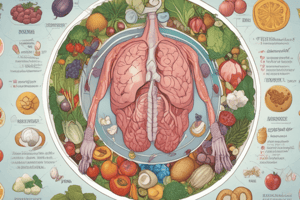Podcast
Questions and Answers
What is the primary source of energy for the body?
What is the primary source of energy for the body?
- Fats
- Minerals
- Carbohydrates (correct)
- Proteins
Which of the following is NOT a type of fat?
Which of the following is NOT a type of fat?
- Monounsaturated
- Carbohydrate (correct)
- Saturated
- Polyunsaturated
What is the primary function of proteins in the body?
What is the primary function of proteins in the body?
- Component of hormones and cell membranes
- Regulation of body temperature
- Energy source
- Building blocks of tissues, organs, and cells (correct)
Which of the following is an example of a micronutrient?
Which of the following is an example of a micronutrient?
What is the recommended weekly duration of moderate-intensity exercise?
What is the recommended weekly duration of moderate-intensity exercise?
What is the term for inadequate or excessive nutrient intake?
What is the term for inadequate or excessive nutrient intake?
Which of the following is an example of a nutrition-related disorder?
Which of the following is an example of a nutrition-related disorder?
How many hours of sleep are recommended for adults?
How many hours of sleep are recommended for adults?
What is the primary characteristic of a Mediterranean Diet?
What is the primary characteristic of a Mediterranean Diet?
Which micronutrient is classified as a fat-soluble vitamin?
Which micronutrient is classified as a fat-soluble vitamin?
What is the recommended daily intake of water?
What is the recommended daily intake of water?
What is a characteristic of mindful eating?
What is a characteristic of mindful eating?
What is the recommended daily intake of fruits?
What is the recommended daily intake of fruits?
What is a type of micronutrient?
What is a type of micronutrient?
What is the recommended daily intake of whole grains?
What is the recommended daily intake of whole grains?
What is a potential consequence of poor nutrition and lifestyle choices?
What is a potential consequence of poor nutrition and lifestyle choices?
Flashcards are hidden until you start studying
Study Notes
Macronutrients
- Carbohydrates are the primary source of energy for the body and can be found in grains, fruits, vegetables, and dairy products.
- There are two types of carbohydrates: simple (sugars) and complex (starches and fiber).
- Proteins are the building blocks of tissues, organs, and cells and can be found in animal products, legumes, nuts, and seeds.
- Proteins are essential for growth, maintenance, and repair.
- Fats are an energy source and a component of hormones and cell membranes, and can be found in animal products, nuts, seeds, and oils.
- There are three types of fats: saturated, monounsaturated, and polyunsaturated.
Micronutrients
- Vitamins are organic compounds essential for various bodily functions and can be classified as fat-soluble (A, D, E, K) or water-soluble (B, C).
- Vitamins can be found in various food sources, including fruits, vegetables, and dairy products.
- Minerals are inorganic elements essential for bodily functions and can be found in foods, water, and soil.
- Examples of minerals include calcium, phosphorus, potassium, and iron.
Nutrient Deficiencies and Disorders
- Malnutrition occurs when there is inadequate or excessive nutrient intake.
- Deficiency diseases include scurvy (vitamin C deficiency), rickets (vitamin D deficiency), and beriberi (thiamine deficiency).
- Nutrition-related disorders include obesity, diabetes, and osteoporosis.
Healthy Eating and Lifestyle
- A healthy diet should include a balance and variety of foods, adequate hydration, and limited processed and sugary foods.
- Regular physical activity is essential for overall health and well-being, with a goal of at least 150 minutes of moderate-intensity exercise per week.
- Important lifestyle habits include stress management, adequate sleep (7-9 hours for adults), and avoiding tobacco and excessive alcohol consumption.
Macronutrients
- Carbohydrates are the primary source of energy for the body and are found in bread, pasta, fruits, and vegetables.
- Proteins build and repair tissues, and are found in meat, fish, eggs, dairy, and legumes.
- Fats provide energy and support growth, and are found in oils, nuts, and fatty fish.
Micronutrients
- Vitamins are essential for energy production, immune function, and growth, and can be classified into two types: fat-soluble (A, D, E, K) and water-soluble (B, C).
- Minerals are crucial for nerve function, bone health, and fluid balance, and can be classified into two types: macro-minerals (calcium, phosphorus, magnesium, potassium, sodium, chloride) and micro-minerals (iron, zinc, iodine, selenium, copper, manganese).
Nutrition Recommendations
- Daily caloric intake varies by age, sex, and activity level.
- The recommended dietary guidelines suggest that 45-65% of daily calories should come from carbohydrates, 15-20% from protein, and 20-35% from fat.
- At least 8 cups (64 oz) of water should be consumed per day.
Health and Nutrition Relationships
- Malnutrition occurs when there is a deficiency in calories, protein, or micronutrients.
- Chronic diseases, such as obesity, diabetes, cardiovascular disease, and certain cancers, are linked to poor nutrition and lifestyle choices.
- Diet quality has a significant impact on mood and cognitive function.
Food Groups and Servings
- The recommended daily intake of fruits is 2-3 cups, with a variety of colors and types encouraged.
- The recommended daily intake of vegetables is 2-3 cups, with dark leafy greens, cruciferous, and colorful vegetables encouraged.
- The recommended daily intake of protein sources is 2-3 servings, with lean meats, fish, eggs, dairy, and legumes encouraged.
- The recommended daily intake of whole grains is 3-5 servings, with brown rice, quinoa, and whole wheat encouraged.
- The recommended daily intake of dairy is 2-3 cups, with milk, cheese, and yogurt encouraged.
Healthy Eating Patterns
- The Mediterranean Diet emphasizes whole grains, fruits, vegetables, and healthy fats.
- The Plant-Based Diet focuses on fruits, vegetables, whole grains, and legumes.
- Mindful eating involves paying attention to hunger and fullness cues, eating slowly, and savoring food.
Studying That Suits You
Use AI to generate personalized quizzes and flashcards to suit your learning preferences.




